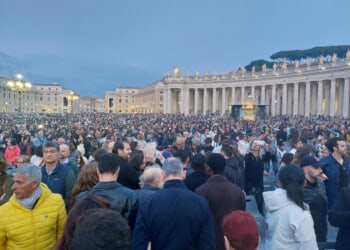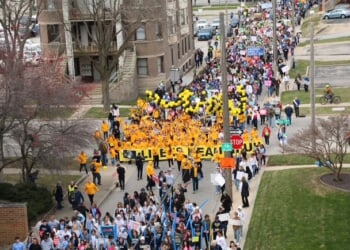
Supreme Court Justice Samuel Alito issued a scathing dissent over the weekend, sharply criticizing the Court’s decision to intervene in the Trump administration’s attempt to deport members of the violent Venezuelan gang, Tren de Aragua, under the Alien Enemies Act (AEA).
In a rare early Saturday ruling, the Supreme Court granted emergency relief that halted deportation efforts, despite the fact that the Fifth Circuit Court of Appeals was still actively reviewing the case.
Justice Alito, joined only by Justice Clarence Thomas, objected to the Court’s actions in a strongly worded dissent.
Trump’s Sovereign Wealth Fund: What Could It Mean For Your Money?
“Shortly after midnight yesterday,” Alito wrote, “the Court hastily and prematurely granted unprecedented emergency relief.”
Justice Alito’s dissent is wild.
Essentially, Alito calls out the other Justices for political weaponization, procedural misconduct, and abusing their positions to obstruct the Trump administration.
We have a rogue judiciary obstructing the will of The People. pic.twitter.com/FhVfGtDSXn
— Clandestine (@WarClandestine) April 20, 2025
This Could Be the Most Important Video Gun Owners Watch All Year
Alito detailed multiple issues with the Court’s move. Among the most pressing, he noted, was the fact that the Court may not have even had jurisdiction over the case at the time.
He also questioned the legal standing of the American Civil Liberties Union (ACLU) in bringing the appeal.
According to Alito, “The ACLU probably did not have the authority to appeal to the Fifth Circuit, much less to the Supreme Court.”
He added that the Fifth Circuit had not finished reviewing the matter when the Supreme Court intervened, even though it was widely understood that a ruling from the lower court was imminent.
The dissent further noted that the federal government had not been provided an opportunity to respond to the appeal before the Supreme Court acted.
Alito argued that there was no clear evidence presented in the filings that justified emergency relief.
Justice Alito also pointed to inconsistencies in how the Court has handled emergency appeals in the past.
He cited South Bay United Pentecostal Church v. Newsom, when Chief Justice John Roberts rejected an emergency appeal challenging California’s COVID-related restrictions on churches.
At the time, Roberts stated that emergency injunctions should only be granted when “the legal rights at issue are indisputably clear and, even then, sparingly and only in the most critical and exigent circumstances.”
Alito questioned why the Court rejected emergency relief for American citizens seeking to worship during a pandemic, yet acted swiftly on behalf of foreign nationals facing deportation due to suspected ties to a violent transnational gang.
In his dissent, Alito also noted that the Supreme Court disregarded developments in a separate federal case.
On Friday night, U.S. District Judge James Boasberg acknowledged that he did not have the authority to halt deportation flights authorized by the Trump administration. Despite this, the Supreme Court stepped in just hours later.
Additionally, Alito took issue with the Court granting relief to a “putative class” of individuals, even though no court had certified the existence of such a class.
He pointed out that the Court has repeatedly held that class-wide relief is generally inappropriate in habeas corpus proceedings.
“Both the Executive and the Judiciary have an obligation to follow the law,” Alito wrote.
“The Executive must proceed under the terms of our order in Trump v. J.G.G., 604 U. S. ___ (2025) (per curiam), and this Court should follow established procedures.”
The ruling and Alito’s dissent come amid heightened legal battles over President Donald Trump’s renewed immigration enforcement efforts, including use of the Alien Enemies Act to deport members of foreign criminal organizations posing national security risks.
While some legal analysts initially assumed the Court was merely seeking to clarify jurisdictional questions, Alito’s dissent has raised concerns about whether the Court’s action reflects a broader institutional challenge to the Trump administration.
As the debate unfolds, the Supreme Court’s emergency decision and the dissent from Justices Alito and Thomas underscore a growing divide within the judiciary over how immigration enforcement cases should be handled—and who gets to make that call.
Connect with Vetted Off-Duty Cops to Instantly Fulfill Your Security Needs

![Justice Alito Issues Scorching Dissent Against SCOTUS Ruling on Trump Deportations [WATCH]](https://www.right2024.com/wp-content/uploads/2025/04/Justice-Alito-Issues-Scorching-Dissent-Against-SCOTUS-Ruling-on-Trump-750x375.jpg)
![NYC Tourist Helicopter Falls into Hudson River, Siemens Executive and Family Among Those Killed [WATCH]](https://www.right2024.com/wp-content/uploads/2025/04/NYC-Tourist-Helicopter-Falls-into-Hudson-River-Siemens-Executive-and-350x250.jpg)






![Green Day’s Cringe Trump Diss Ends in Fire and Evacuation [WATCH]](https://www.right2024.com/wp-content/uploads/2025/04/Green-Days-Cringe-Trump-Diss-Ends-in-Fire-and-Evacuation-350x250.jpg)
![Red Sox Fan Makes the ‘Catch of the Day’ with Unconventional ‘Glove’ [WATCH]](https://www.right2024.com/wp-content/uploads/2025/04/Red-Sox-Fan-Makes-the-‘Catch-of-the-Day-with-350x250.jpg)






